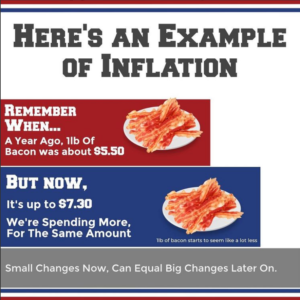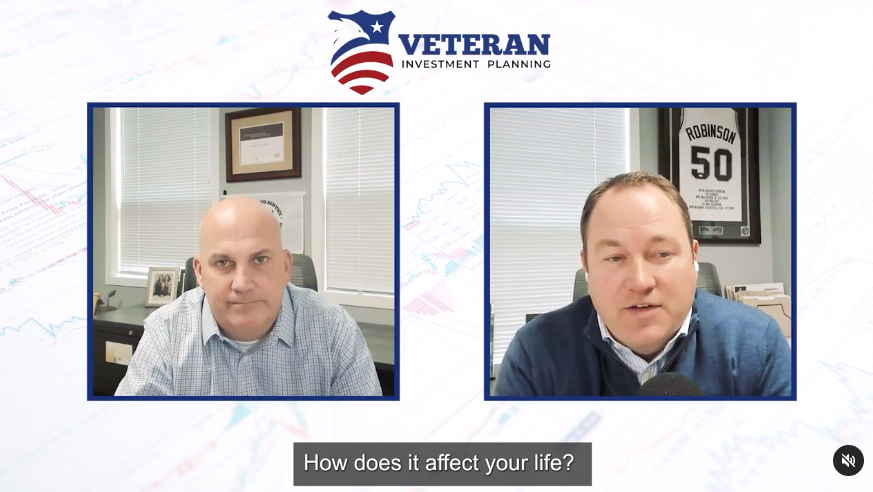Adam Stalnaker 0:05
Hey welcome Adams talker and Joe Kovach here. We’re here to talk about a hot topic that I think a lot of you have seen on the news recently inflation. What we’re going to talk about is what actually is inflation? How does it affect your life? And, you know, what does it how does it translate into the investment world? Joe, what what do you what is the definition of inflation?
Joe Kovach 0:26
It’s pretty, pretty simple. It’s just an economy that has rising prices. And you know, those rising prices mean that your dollar just doesn’t stretch quite as far as it used to stretch.
Adam Stalnaker 0:36
Anybody that’s going to the grocery store is seen in this one hits home for Joe pretty hard is the price of bacon.
Joe Kovach 0:42
Yeah, exactly. A great example. It’s one of my favorite treats. Oh, yeah. A year ago, a pound of bacon was about national average is about $5.50. That’s up to 730. Give or take now. It’s about a 30% increase. gallon of gas. I think we all use that pretty regularly. At least
Adam Stalnaker 0:57
I think we’ve all seen that one. Yeah, that one’s about, that’s probably the most most apparent I think everybody that’s driving his drives by a gas station and isn’t shocked from from time to time.
Joe Kovach 1:08
Absolutely. So you’re looking at you know, last year national average about two and a quarter per gallon of gas right now that’s running around 340. So that’s about a 50% increase. So everything’s, everything’s just become a lot more expensive. And those are just a couple, you know, there’s countless numbers of examples.
Adam Stalnaker 1:21
Another one, I just ran across the average price of a car, a new car was $43,000, which was amazing to me that that’s, but it’s that high. Right? But it’s up 550 $500 year over year, which is huge. Like, I mean, that’s a huge increase. So, you know, in, you know, as we talk to clients, you know, some of the things we’re telling them is, you got to watch, watch that budget right now. Right?
Joe Kovach 1:47
You really do you really do. I mean, it’s your dollars, just like says not stretching as far as it used to go. So you’ve maybe got to cut back on a few things. If budgets are tight. You may be downgrade in terms of quality a little bit, you know, on the food, you know, go to generic brands, instead of name brand things like that. It’s it’s, it’s a it’s a tough environment. It’s been that way this year, it’s gonna last that way into 2022.
Adam Stalnaker 2:08
Yeah, on the car front, like I was, I was like, You know what, maybe I’ll look into getting a new car and I’m like, Well, maybe my car is can last a couple more years. I can I can wait, wait this thing out? Because I mean, you could just see the supply, right? I mean, you drive by any car dealership, and it’s it’s a ghost town when they were sprawling and overflowing with cars, there’s, there’s not many there anymore.
Joe Kovach 2:29
And you bring up a great point. You know, that’s, that’s the textbook definition of inflation. And how it’s caused, right is too much too much money chasing too few goods. And we’ve had the perfect storm, right? We come in at COVID, we had lower supplies, because you know, manufacturing was down. Then also we came out of COVID demand picked up in a big spike. So you’ve got all this money from, you know, additional money from the Federal Reserve and everything and stimulus plans chasing fewer goods, and prices just gravitate up right away on that it was it was a textbook, just perfect storm for that.
Adam Stalnaker 3:00
Yeah. And it kind of the third and final thing we wanted to cover today was how does this translate into the investment world?
Joe Kovach 3:08
Exactly? Yeah, no. And that’s important, right? Because everybody, you know, has got some form of investments. So you look at and say, Well, you know, what, what asset classes maybe don’t do as well and rising inflation, that the number one would be bonds, interest rates tend to go up during times of inflation, they’re already starting to try and go up, you hear the Federal Reserve said, you know, we’re originally ever talking about not wanting to raise interest rates into 2023. Now they’re talking about possibly, you know, third quarter fourth quarter of 2022. So it’s been pulled forward. So the interest rates going up, bonds don’t react well, to that, that would be an asset class, you have to be a little bit careful. But on the you know, on the on the opposite side, I think there’s a lot of assumptions that stocks maybe don’t do well during times of high inflation and actually, historically, they’ve actually done pretty well especially stocks that have what we call pricing power, things like you know, a company like Procter and Gamble or Nike that can increase their price based on you know, the the the manufacturing costs, the wage, you know, increases that have occurred and so forth. So, you know, you want it is a good time to look at your allocation, see what you’re allocated into, you know, we certainly don’t advocate everybody putting everything into stocks unnecessarily, you know, but maybe the bond side of your portfolio, you try to avoid US Treasuries, which are, you know, maybe going to be the most sensitive, maybe go to more corporate bonds and things like that. Yeah,
Adam Stalnaker 4:27
I think the biggest conversations we have with clients is if you have concern, let’s review your your asset allocation. Absolutely. Let’s review your goals and maybe it’s time to tone down some some of those different asset classes that you might be overweighted that just might not perform as well and feel free to reach out to us if if there’s a you know, a case where you’re you’re unsure if you’re allocated properly.
Joe Kovach 4:50
Absolutely. Happy to look at anything.
Adam Stalnaker 4:53
And, you know, at this point, I think we’re gonna we’re gonna call it on the conversation with inflation here, but you know, We’ll have opportunities in the comments to add some different topics that maybe you guys want to talk about a little bit more but today you know you know if you want to continue the conversation to feel free to reach out on inflation
 Inflation Is An Economy, With Rising Prices
Inflation Is An Economy, With Rising Prices
